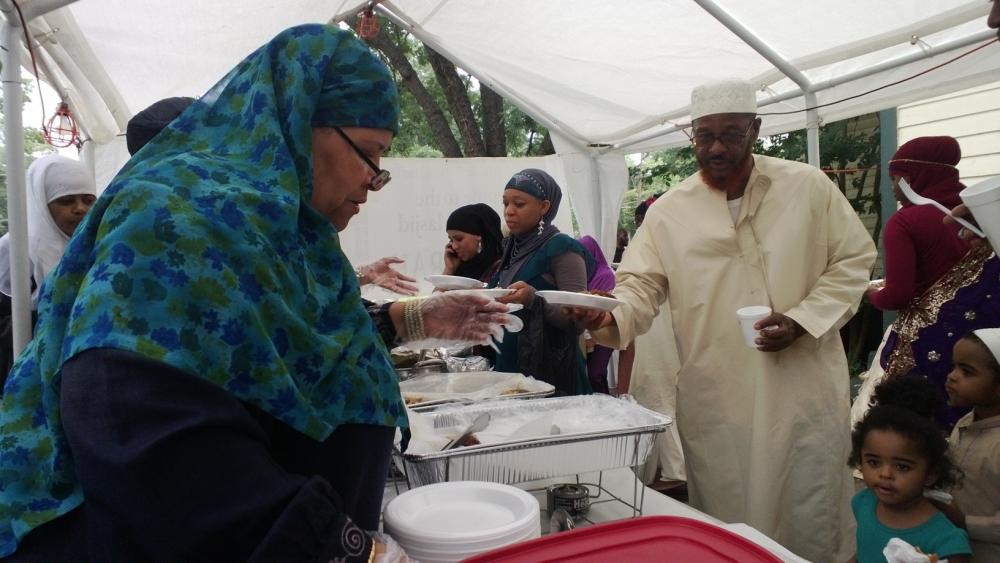
Section Branding
Header Content
Ramadan Ends, Eid Begins
Primary Content

Muslims are marking the end of the holy month of Ramadan. And that means special prayer services, brunches and no more fasting. Thousands attended services across Georgia Friday morning, and afterwards several hundred chowed down at a brunch in Atlanta’s West End neighborhood.
Inside the tiny kitchen at the Community Masjid of Atlanta, women in head scarves are cracking eggs and then scrambling them.
Outside the mosque, another group of women is setting up a half a dozen serving tins for the dishes that are ready to eat.
Mu’Mina Ali is in charge of the mosque’s annual feast of Eid brunch marking the end of Ramadan. She’s the wife of Nadim Ali, the imam who leads the mosque.
“What do we have here?” she asks.
“This is potatoes. This is bacon. This is salmon patties, salmon patties.”
Mu’Mina says she’s expecting a pretty good crowd.
“They come in waves so I really don’t know. We usually feed about 300 people by the end of the day,” she said.
Slowly more members of the mosque arrive. And around noon, the women begin serving brunch. Mu’Mina takes orders.
“Pancakes or grits?” she asks.
“Pancakes,” comes the reply.
Most people are getting a bit of everything to eat. Now that Ramadan is over, they won’t have to fast from dawn to sundown. During the long summer days, that meant not eating or drinking for as long as 14 hours.
In addition to fasting, Muslims pray more. And they strive to be better people. That means cutting out vices like smoking, swearing and losing your temper.
Saabirah Jawad pushed herself this year. A student at Georgia State University, she took a summer class five days a week while fasting and taking care of her family.
“This year, as far as being tired, I was exhausted,” she said. “But it was a good exhaustion.”
That’s because Muslims are meant to test their limits during Ramadan, says another member of the mosque, Dawud Mahdi.
“The focus isn’t on what you can’t do. The focus is on having the discipline,” he said.
And a month of such discipline makes the first day after Ramadan one of celebration and relief, says Nadim Ali, the imam..
“The Eid is like the day of recurring joy,” he said. “You see people you don’t see but once a year in many instances. This is a day the Creator says, ‘You have passed the test. Now get a rest.’”
But there’s still work to be done. That’s because many Muslims strive to retain the good habits they developed during Ramadan.
Mu’Mina even picked one up. Normally she gives up electronics but this year she allowed herself to use the computer. And she began studyinh the Koran in the original Arabic through YouTube videos.
“You know, when I became Muslim over 30 years ago, we had a few books translated,” she said. “But now I listened to lectures and I was actually learning some verses of the Koran in Arabic.”
And that’s given her a whole new focus for the year to come.
“I think through this year I’d like to continue that because I can do that on my own,” she said.
Then she thought and a minute and added, “Online learning of the Koran – who would have thought it?”
She has until next June, when Ramadan begins again, to give it a try.
Tags: Muslims, Ramadan, fasting, end of Ramadan, prayer services, Atlanta’s West End neighborhood, Community Masjid, Eid.
